
The elimination of thousands of jobs and store closures announced this week raises the question of the factors which are leading these large groups in the agri-food industry to review their development model. Decryption with sociologist Jean Viard
franceinfo: Are we seeing the end of supermarkets or at least certain types of supermarkets?
Jean Viard: The end of supermarkets, certainly not. But what is certain is that on the one hand, there is inflation which has hit hard, there are people who consume less. Secondly, there are the brands that arrive, Lidl and others, often Dutch or German brands which have a different sales culture, there are few products, it's a bit in bulk and it's much less Dear. So there are new entrants, and then there is a major new entrant, which is e-commerce.
The great pandemic has pushed everyone to order online, and that is causing job losses in supermarkets. But deliveryman jobs, etc. should be taken into account. which are developing, to have a global vision of the issue. It's not the end of supermarkets, because the chains tend to open small local shops, but on the other hand, the very large supermarkets outside the towns where we went by car to spend the afternoon, Firstly they restrict their surface area and often part of the store becomes a logistics place where packages are prepared for deliveries or drive-through.
And so, there is this development which means that these very large areas of large urban peripheries, I think that in the long term they are rather doomed, and they will effectively transform into a logistics system.
Finally, we see it with Auchan which is going to reduce the size of its hypermarkets by 2028, we see brands investing in city centers, the model of the big store on the outskirts is less on the rise?
63% of people live in houses with gardens, around towns or in the countryside. So obviously, they are not going to go shopping in the city center. It turns out that to enter a city, the streets have not been widened much, and there are twice as many of us as there were a century ago. So the city, we are not all going to do our shopping in the city center.
On the other hand, we are indeed developing local shopping, so for people in the city center, we are reopening shops, but we are also reopening some in the outskirts, including small ones. Look at the bakeries, it's extraordinary, everywhere we open bakeries, but you can also have a sandwich, eat there for lunch, so there, you have new forms of organization, because for all these businesses, it is necessary that 'They have parking lots, and you have bakeries everywhere outside of a town or villages where there is a parking lot in front.
And supermarkets are also adapting with new services, but some also offer telephone plans, cars, toys, DIY, have they understood that this is necessary for their survival?
Yes, but everyone seeks a balance. So the problem is that the idea of the completely monomaniacal store was a period. We are looking for a different balance, but the real question is: how do we create a link and what is the ecological impact of all these questions. Is delivering things from an ecological point of view absurd, it's not safe because you have a van that's going to deliver 30 people who live on the same street, it's maybe- be better than 30 cars going to the supermarket.
And in this society, we are first in the digital world and next to it, we are around our home. And it's this couple who set up because we order online and then we go and treat ourselves in two or three shops near our house.
And with purchasing power reduced, the French also consume differently. It's less obvious today to stock up on groceries for 10 or 15 days in one go; the consumer makes more choices perhaps?
Of course, because we see very clearly that people who are a little better off save a lot, because they are afraid of the future, so they consume less. And then the most modest people, for whom food prices have increased by more than 20%. Currently, inflation has almost stopped, but it has not come back down.
And in the United States, it's the same thing, I think that inflation has a lot to do with Donald Trump's success. The Democrats did not see that for modest people, inflation had stretched the rope, and that they had not recovered. And in France, we have the same situation and I think that inflation had a lot to do with last year's electoral results.





